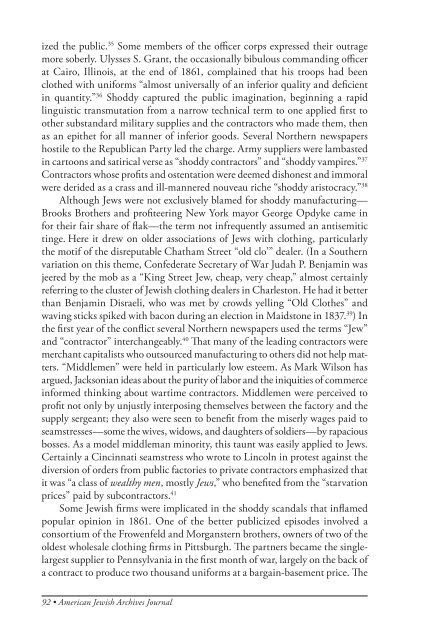American Jewish Archives Journal, Volume 64, Numbers 1 & 2
American Jewish Archives Journal, Volume 64, Numbers 1 & 2
American Jewish Archives Journal, Volume 64, Numbers 1 & 2
You also want an ePaper? Increase the reach of your titles
YUMPU automatically turns print PDFs into web optimized ePapers that Google loves.
ized the public. 35 Some members of the officer corps expressed their outrage<br />
more soberly. Ulysses S. Grant, the occasionally bibulous commanding officer<br />
at Cairo, Illinois, at the end of 1861, complained that his troops had been<br />
clothed with uniforms “almost universally of an inferior quality and deficient<br />
in quantity.” 36 Shoddy captured the public imagination, beginning a rapid<br />
linguistic transmutation from a narrow technical term to one applied first to<br />
other substandard military supplies and the contractors who made them, then<br />
as an epithet for all manner of inferior goods. Several Northern newspapers<br />
hostile to the Republican Party led the charge. Army suppliers were lambasted<br />
in cartoons and satirical verse as “shoddy contractors” and “shoddy vampires.” 37<br />
Contractors whose profits and ostentation were deemed dishonest and immoral<br />
were derided as a crass and ill-mannered nouveau riche “shoddy aristocracy.” 38<br />
Although Jews were not exclusively blamed for shoddy manufacturing—<br />
Brooks Brothers and profiteering New York mayor George Opdyke came in<br />
for their fair share of flak—the term not infrequently assumed an antisemitic<br />
tinge. Here it drew on older associations of Jews with clothing, particularly<br />
the motif of the disreputable Chatham Street “old clo’” dealer. (In a Southern<br />
variation on this theme, Confederate Secretary of War Judah P. Benjamin was<br />
jeered by the mob as a “King Street Jew, cheap, very cheap,” almost certainly<br />
referring to the cluster of <strong>Jewish</strong> clothing dealers in Charleston. He had it better<br />
than Benjamin Disraeli, who was met by crowds yelling “Old Clothes” and<br />
waving sticks spiked with bacon during an election in Maidstone in 1837. 39 ) In<br />
the first year of the conflict several Northern newspapers used the terms “Jew”<br />
and “contractor” interchangeably. 40 That many of the leading contractors were<br />
merchant capitalists who outsourced manufacturing to others did not help matters.<br />
“Middlemen” were held in particularly low esteem. As Mark Wilson has<br />
argued, Jacksonian ideas about the purity of labor and the iniquities of commerce<br />
informed thinking about wartime contractors. Middlemen were perceived to<br />
profit not only by unjustly interposing themselves between the factory and the<br />
supply sergeant; they also were seen to benefit from the miserly wages paid to<br />
seamstresses—some the wives, widows, and daughters of soldiers—by rapacious<br />
bosses. As a model middleman minority, this taunt was easily applied to Jews.<br />
Certainly a Cincinnati seamstress who wrote to Lincoln in protest against the<br />
diversion of orders from public factories to private contractors emphasized that<br />
it was “a class of wealthy men, mostly Jews,” who benefited from the “starvation<br />
prices” paid by subcontractors. 41<br />
Some <strong>Jewish</strong> firms were implicated in the shoddy scandals that inflamed<br />
popular opinion in 1861. One of the better publicized episodes involved a<br />
consortium of the Frowenfeld and Morganstern brothers, owners of two of the<br />
oldest wholesale clothing firms in Pittsburgh. The partners became the singlelargest<br />
supplier to Pennsylvania in the first month of war, largely on the back of<br />
a contract to produce two thousand uniforms at a bargain-basement price. The<br />
92 • <strong>American</strong> <strong>Jewish</strong> <strong>Archives</strong> <strong>Journal</strong>
















